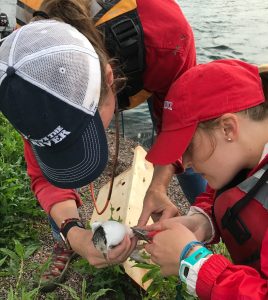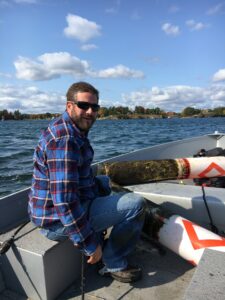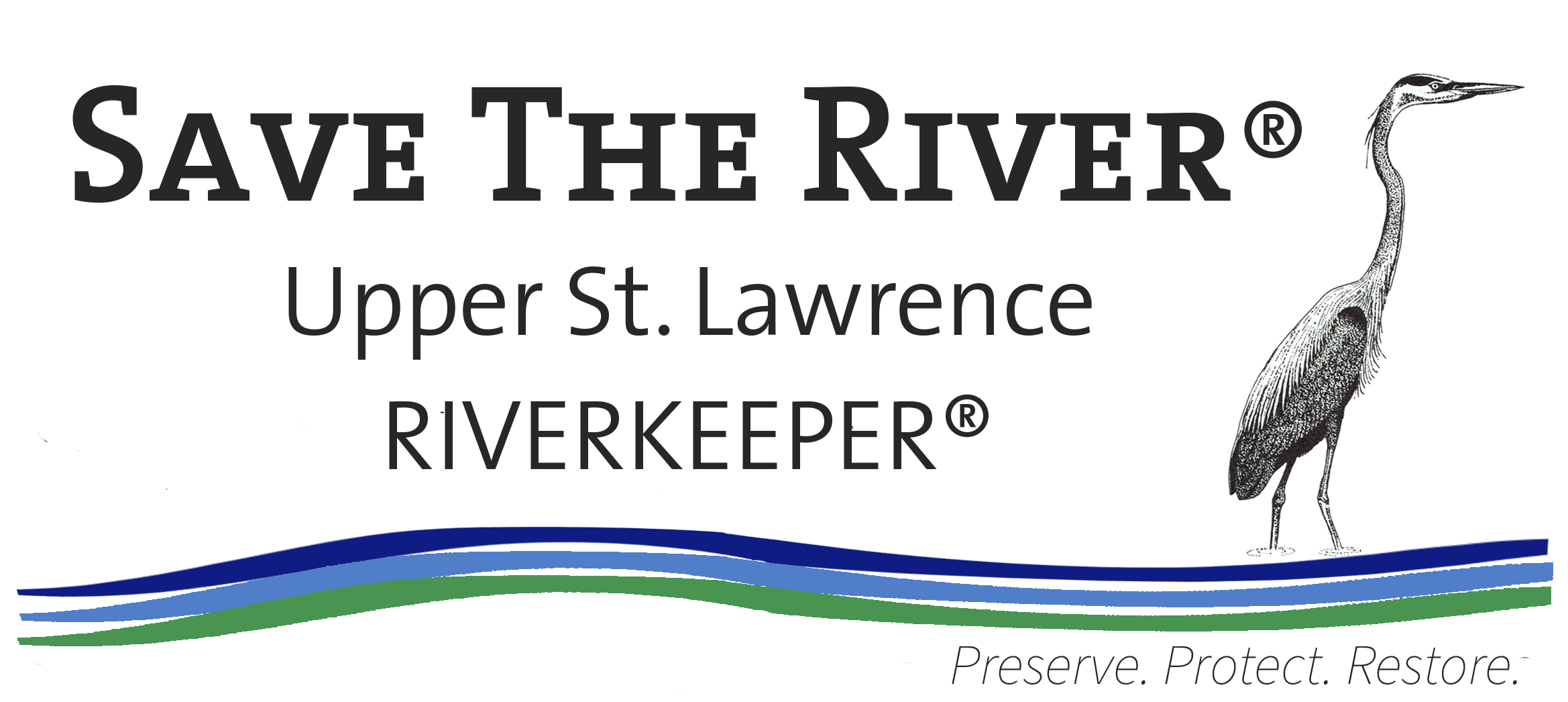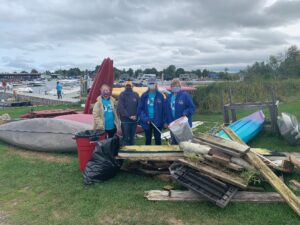2020 will go down as a unique summer on the River. Beautiful and windy weather, and pandemic constraints. But in spite of Covid-19, it was a very busy summer for Save The River (STR). Working remotely, our dedicated staff was able to keep all of the programs moving ahead and introduced Trash Free River to remove truckloads of plastic and trash from the River.
As we watch the weather change from fall to the colder days and nights of winter, I would like to take this opportunity to update you on progress at STR:
Education– STR’s In the Schools and On the Water programs came to a grinding halt last spring due to Covid-19 constraints. Our outstanding Education Committee, now being led by Heather White and Lauren Eggleston, has worked tirelessly with other committee members to reimagine our education programs.
It’s Hard to be a Tern, Haas the Great Blue Heron, and Rock Island Lighthouse & Island Habitats Virtual Field Trip
Several more digital lessons are in the planning and completion stages. Please feel free to share these links with your children and grandchildren, and be sure to watch the education portion of our website for new offerings. Additional information about our education program can be found in Lauren’s article elsewhere in this newsletter.
 Common Tern Restoration– What struck me as unique about this year’s effort to restore and band these threatened shore birds, that are so much a part of our River experience, was the dedication of our volunteers and staff to keep the program viable in spite of Covid. It was hot and muggy out on the sites wearing masks, but we made it work and banded a large number of chicks. Our cadre of tern farmers are already making plans for 2021
Common Tern Restoration– What struck me as unique about this year’s effort to restore and band these threatened shore birds, that are so much a part of our River experience, was the dedication of our volunteers and staff to keep the program viable in spite of Covid. It was hot and muggy out on the sites wearing masks, but we made it work and banded a large number of chicks. Our cadre of tern farmers are already making plans for 2021
Advocacy – Quite often I cite Save The River’s mission to restore, preserve & protect the Upper St. Lawrence River now and for generations to come through advocacy, education and research. Kendall has been keeping a log of our advocacy since the start of the year on several different issues. This link will take you to that spreadsheet, and show you the depth and breadth of STR’s advocacy on behalf of the River.
Covid 19 testing in sewage effluent – STR has been advocating at the local, state, Federal and Canadian provincial level for a program of testing for the presence of Covid-19 in wastewater. Research has shown that traces of Covid-19 show up in wastewater five to seven days before people become symptomatic. After sending information about these programs to municipalities and legislators, several towns and counties have begun the testing. One county legislator acknowledged that STR’s advocacy on the issue played an important part in their decision to move forward with the testing program.
Sho almarking – After many years of working together with Thousand Islands Association (TIA) on shoal marking in the 1000 islands, the markers placed on both sides of the River are now in the process of being placed on a joint webpage. This collaborative project is being administered by TIA’s Mike Spies, and should be ready for viewing later this winter!
almarking – After many years of working together with Thousand Islands Association (TIA) on shoal marking in the 1000 islands, the markers placed on both sides of the River are now in the process of being placed on a joint webpage. This collaborative project is being administered by TIA’s Mike Spies, and should be ready for viewing later this winter!
We are currently updating STR’s shoal marking program. Look for a more streamlined communications process as we recruit new volunteers to replace some of our older stalwarts – such as myself. Those markers have gotten a lot heavier over the past decades.
This picture of Rob Rockell, current Board member, illustrates that there is a changing of the guard going on in shoal marking. Please reach out to Lindsey at outreach@savetheriver.org if you are interested in getting involved with shoalmarking.
Sustainability – STR’s sustainability program, under the enthusiastic and thoughtful leadership of Lauran Throop, has grown to encompass much more than its original Replace Single-Use Plastics program. Our advocacy to encourage NYS to begin enforcement of the ban on single-use plastics is finally paying off as the State will begin fining stores that continue to give out plastic bags after October 19.
Natural Edge Shorelines – While STR has not yet been able to secure a grant to bring Watershed Canada’s successful Natural Edge shorelines program to New York, efforts are still underway to find a grant to accomplish that goal. In the meantime, STR has been asked to take an active role in working with consultants to recommend natural plantings that will be used in rain garden catchments in the redesign of Clayton’s waterfront work planned near Harbor Hotel. Encouraging Natural Edge shorelines along the River and Lake Ontario is an important component of countering the effects of Climate Change.
Septic System “Booklet” update – STR’s Septic System “Booklet” is going digital! Thanks to a donation from long-time member Judy Sweet, our information on septic systems will soon be available on our website. The project is the culmination of work and an island visit by Lauren and Zach Russel, where a new septic system has been installed and is functioning to protect the River and health of people and wildlife. Stay tuned to our eblasts for an announcement of when you can view and download the new “booklet”, which will include many helpful links.
Trash Free River Cleanups – STR’s long-time goal of organizing shoreline cleanups finally received the boost it needed this summer with funding from the Leonard C. and Mildred F. Ferguson Foundation. The lead article in Riverwatch is about this project. There was great enthusiasm from the over 90 volunteers who participated in the first two days of the First Annual Trash Free River cleanup. Additional cleanups are taking place this fall by staff and volunteers as weather and time permit.
NYSDEC Mussel Grant Progress – STR’s project coordinator Lauren Eggleston has an excellent update on this project elsewhere in this issue. In conjunction with the St. Regis Mohawk Tribe and New York State Museum, STR is working with DEC on research on native mussels at the superfund site in Massena. In the second year of a three year grant, we are developing the educational component of the project while being sensitive to Covid-19 restrictions placed on schools and employees.
Asian Carp – Funding for the final design phase of the Brandon Road project to build the infrastructure to stop progress of Asian Carp has been approved by Congress in the most recent Water Resources Development Act (WRDA). Progress on this approval has been painstakingly slow, and I hope the completion of the physical construction will not be too late to stop the carp from entering the Great Lakes. There is relatively new research that shows that these carp could live off detritus deposited on the lake bottoms.
Run for The River 2021 – After a scramble to switch to a virtual run format in 2020, plans are being made for 2021. Our Run committee, headed by Development Director Bridget Wright, will be closely following the Covid updates as they continue their planning. It would be wonderful to be able to host Run for the River 2021 on the recently upgraded Clayton waterfront. Keep your fingers crossed….
Water Levels – As of this writing, water levels in the three middle Great Lakes are still near historic high seasonal levels. In September of this year, Save The River wrote the Seaway administrators “ … with the immense amount of water still upstream of Lake Ontario and flowing towards the St. Lawrence, Save The River believes that the Seaway should put shippers on notice that if high water levels warrant higher flows than are deemed safe for navigation, shippers should prepare flexibility in their scheduling for both closing and spring opening dates of the Seaway.” Looking at the level of the upper Great Lakes, I believe that you should plan for high water again next spring.
As we head into the holiday season, all of us at STR wish you good health. We will be continuing to work remotely through the early part of winter, and reassess working conditions mid-winter.
Stay well,
John

